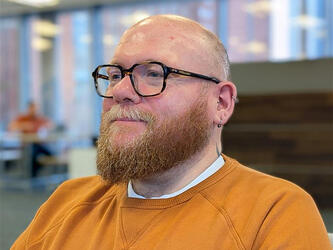Making a choice
There are easy jobs, there are difficult jobs, and then there are challenging jobs. It’s safe to say Vix Proctor’s role – as head of marketing at Marie Stopes UK – falls into the latter category. Not that she comes across as someone struggling with her challenge. Proctor is full of enthusiasm as she talks about the importance of giving accurate information to people so they can make appropriate choices about their reproductive health. It’s a point she reiterates throughout our interview, and it ensures any controversy around the role of Marie Stopes is very firmly dealt with.
This month, Marie Stopes celebrates its 40th anniversary, which means Proctor has a valuable promotional hook for fundraising. “As a charity, I want us to celebrate what we do and how we’re here for women,” she says.
However, the history of the organisation extends further back than 40 years, to 1921, when Marie Stopes set up the first family planning clinic in the UK. Her interest in this area came about when her first marriage was annulled after five years because it had not been consummated. Stopes realised that if she – as an educated, middle-class woman – lacked sexual knowledge, then others, especially less-educated women, were probably in the same boat.
The charity bearing her name came into being in 1976, when Dr Tim Black took over the clinic that Stopes had set up and which, by then, was in financial difficulties. In his early career, Black had worked as a doctor in the Papua New Guinea jungle; here he came to understand that “preventing birth could be as important as saving a life”.
Black’s vision for the organisation was based on a business model in which those using its services were treated as clients rather than patients. He saw it as a ‘social business’ offering contraception, pregnancy testing, screening, abortion and sterilisation.
Initially, Black built up the enterprise in the UK – opening more clinics – but he then began working with overseas partners, initially in Sri Lanka and Kenya. So, today, there are two strands to the organisation: Marie Stopes UK and Marie Stopes International, each with different business models.
“The international side operates as an NGO [non-governmental organisation] and it gets funding from programmes that could be sexual-health orientated,” explains Proctor. “But, in the UK, we’ve been working with the NHS for more than 30 years and that’s very much about providing the [abortion and vasectomy] service on its behalf. We’ve got about 130 contracts with the NHS in England and our fastest-growing contract area is vasectomy.”
Indeed, vasectomies have been the focus of Proctor’s recent marketing activities, with a campaign that ran at the end of the 2015/16 football season designed to get men and women talking about this form of contraception (see box). It was driven by an insight into who was using which services.
“Everyone thinks the typical age of someone coming in for an abortion is fairly young, but we’re talking early 30s now as the average age, and the women have got a child already,” says Proctor. “So we have a real opportunity to engage with the vasectomy market because it has to be talked about as a form of contraception. I felt it was time in the UK for men to start discussing their reproductive options.”
The limited budgets of Marie Stopes UK mean its focus is usually on the referrers – engaging with GPs and ensuring they have the right information. But accessing women and men, to help them make informed decisions, runs in parallel with that. For some, however, abortion is a controversial subject, and the pro-life, anti-abortion lobbyists are organised and prolific. Not that this daunts Proctor, having come from an HIV and sexual health background. “I’m used to that stigma and dealing with a topic that people don’t want to talk about,” she says. “It’s about enabling them to have that open discussion.”
To this end, Marie Stopes has started using social media to stimulate debate and extend its support, seeing it as a good platform to encourage people to talk about things they might previously have avoided. “We only joined Twitter and Facebook in 2014, and we try to use the social media platform to access people who are hard to reach.”
An interesting dynamic with social media, Proctor says, is that people engage with questions: “If we put a post saying that we have a service in Manchester, and someone says ‘who would want their balls touched’, someone else will go ‘hey, having a vasectomy is the best thing I’ve ever done, don’t be so stupid’ – and then others comment, so you get this amazing conversation.”
NHS service
Because of the dual business model Marie Stopes operates, fundraising and fund allocation works in a specific way. While the majority of the UK’s work is supporting the NHS – and that money is ring-fenced to remain within NHS work – the organisation also operates private services and that profit is reinvested in NGO projects.
“Our fundraising is mainly based around helping women in Ireland. The NHS is extremely good at helping women in England – it funds services, complications and makes sure women have all the support they need with follow-up contraceptive options. But in Ireland – because it’s illegal – that system doesn’t work. So what we do is help fund women’s travel. We will help in any way possible; that could be discounting our prices – which are already significantly discounted for Irish women – or sending them taxis from the airport,” says Proctor.
There are no protesters staked outside the Marie Stopes offices when I do this interview, but they are a common sight outside many clinics. “The protesters have a right to freedom of speech. Unfortunately, I think some of the information they have is a little misguided,” says Proctor. “They have a fundamental right to stand up for what they believe in – but standing outside a clinic is not going to do any good.
“Once a woman is coming to the appointment, you’re going to make very little difference to her – you’re just going to make a bad day even worse. The protesters will never get in the way of our service.”
Quality standards
When it comes to information, the Marie Stopes marketing team follows very strict NHS guidance laid out in its Information Standard. “That’s an evidence-based scheme, so all the health information that may result in a health decision is the best possible. It’s evidence-based, user-tested and peer-reviewed, so goes through a huge process – it takes a long time and then it’s reviewed regularly,” explains Proctor.
“We find information and make sure we have a research aspect to every campaign. We have innovation developments where we interview internal and external stakeholders; we have different audiences, segregate them and give them different personas.”
With its limited budgets, all this is done internally by the marketing team, with minimal outside agency involvement. Beyond that, Marie Stopes carries out audience research among those who attend its clinics, and is currently looking at ways to improve this. Much of the insight the organisation uses to develop its work comes from its call centre in Bristol, looking at the main queries raised by callers.
So, if money was no object, how would Proctor spend her marketing budget? A celebrity promotion, she says. “Jamie Oliver said he’d never have a vasectomy, because his wife doesn’t like it, and his mate had it and it went wrong. So I’d love to invite him to do one with us – to do something end to end to show how easy it is, and how simple it is to make a difference to your life and relationship.”

We hope you enjoyed this article.
Research Live is published by MRS.
The Market Research Society (MRS) exists to promote and protect the research sector, showcasing how research delivers impact for businesses and government.
Members of MRS enjoy many benefits including tailoured policy guidance, discounts on training and conferences, and access to member-only content.
For example, there's an archive of winning case studies from over a decade of MRS Awards.
Find out more about the benefits of joining MRS here.















0 Comments